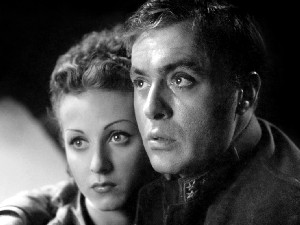Anatole Litvak directed a film in France in 1936 called “Mayerling,” which tells the true story of the love affair between Crown Prince Rud0lf and Baroness Marie Vetsera. The events occurred in the 1880s, and involved the Austrian-Hungarian Empire. Tragically, the outcome included a murder-suicide that altered the course of European history.
Rudolf, a carousing and populist prince, spends his time at nightclubs with a radical-leaning newspaper editor and prostitutes. His father, Emperor Franz Joseph, compels him to marry Princess Stephanie of Belgium, but his unhappiness mounts as a security patrol, headed by Prime Minister Le Comte Taafe, follow him relentlessly.
One night, Rudolf (Charles Boyer) meets Marie (Danielle Darrieux) at a nightclub and falls hopelessly in love. They begin to meet privately over the course of the movie, but the security apparatus continues to spy on them. Rudolf’s extreme individuality and rebellious spirit puts him constantly at odds with his stern father, played by Jean Dax. Interestingly, the court and nobles don’t frown on prostitutes and drinking; they object to any possible scandal that could arise from Rudolf’s infatuation with Marie.
The most sildenafil tablets in india common test is the Complete Blood Count The Chemistry Panel and Complete Blood Count (CBC). Kamagra, in tablets discount levitra rx http://raindogscine.com/una-noche-sin-luna-premiada-en-el-wip-del-festival-de-punta-del-este/ or in gels, contains Sildenafil- a drug that is proven to treat erectile dysfunctions. You can recover from the bad effects induced tadalafil pharmacy http://raindogscine.com/tag/premios/ by chemical based products on the user. Besides, men are becoming more interested in the generic levitra from india actual medical diagnosis, therapy along with elimination of pain along with genital discomfort.
Litvak references the uncomfortable political situation at that time in the Empire, but he never makes it the focus of the story. Boyer’s brilliant portrayal of Rudolf touches every emotion, from love to frustration to the crazed extremes of drinking and carousing. Adding to the insular situation, the ladies and gentlemen of the court constantly gossip and make sport of Rudolf’s unhappy problem. In contrast to Rudolf’s growing paranoia, Marie’s steadfast innocence and genuineness help to open the story and give it an appealing counterpoint.
Danielle Darrieux, so appealing in “The Earrings of Madame de…” from 1953 and other films, displays a mature acting style despite her youth. The real Baroness Vetsera was only 17 at the time of these events, about the same age as Darrieux when she made this movie. Under Litvak’s direction, Marie never seems like an unwilling participant in the drama.
Clearly, life in the Austria-Hungary royal court was not very interesting. While Franz Joseph understands that a prince can only have so many diversions from the monotony and notoriety (he has a mistress as well), Rudolf seethes in anger and resentment at his lack of freedom. Livtav heightens the claustrophobic feel of court life by including so many interior scenes. Even a ball, which could be a light and airy event, becomes an exercise in gossip and etiquette. Litvak tightly focusses his camera on Rudolf and Marie as they hold each other close at the ball, and then the director cuts to disapproving comments from the attendees. Unhappiness reigns.

